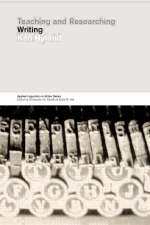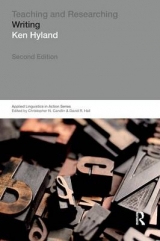
Teaching and Researching Writing
Longman (Verlag)
978-0-582-42338-1 (ISBN)
- Titel erscheint in neuer Auflage
- Artikel merken
This authoritative introduction provides a highly readable and up-to-date guide to the major themes and developments in current writing theory, research and teaching. It is designed for anyone looking for an overview of current views on writing and the ways theory has been translated into teaching and research. Covering important theoretical and conceptual issues, the book addresses current key questions, and includes a detailed chapter offering suggestions for research projects illustrated with case studies.
Ken Hyland is Associate Professor in the Department of English at the City University of Hong Kong.
SECTION ONE: CONCEPTS AND ISSUESCHAPTER 1. A CONCEPTUAL OVERVIEW OF WRITING 1.1 Text-oriented research and teaching 1.1.1 Texts as autonomous objects 1.1.2 Texts as discourse 1.2 Writer-oriented research and teaching 1.2.1 Writing as personal expression 1.2.2 Writing as a cognitive process 1.2.3 Writing as a situated act 1.3 Reader-oriented research and teaching 1.3.1 Writing as social interaction 1.3.2 Writing as social construction 1.3.3 Writing as power and ideology 1.4 Conclusions and readings 2. KEY ISSUES IN WRITING 2.1 How is writing different from speech? 2.2 How is writing related to literacy? 2.3 What is an expert writer? 2.4 How do genres differ? 2.5 How does writing express identity? 2.6 How does writing express social relationships? 2.7 What is the impact of new technologies on writing? 2.8 How should we teach writing? 2.9 Conclusion and readings SECTION TWO: APPLYING WRITING RESEARCH 3. RESEARCH-BASED WRITING COURSES 3.1 WRIT 101: Process in practice 3.2 Genre in primary classrooms: The NSW K-6 syllabus 3.3 Go for Gold: writing for a reason 3.4 Readings 4. RESEARCH-BASED MATERIALS, METHODS AND RESOURCES 4.1 Research writing: An advanced EAP textbook 4.2 WordPilot 2000: corpora assisted writing 4.3 Writing networks: Interaction in an ESL computer workshop 4.4 Writing portfolios: Pedagogy and assessment 4.5 Conclusion SECTION THREE: RESEARCHING WRITING 5. RESEARCH PRACTICE AND RESEARCH ISSUES 5.1 Practitioner research 5.2 Researching texts 5.3 Researching writers 5.4 Researching readers 5.5 Readings 6. RESEARCH CASES 6.1 Questionnaire research on readers' beliefs and practices 6.2 Experimental research on peer response training 6.3 Text analysis research on email business correspondence 6.4 Learner corpora research on hedging and boosting 6.5 Interview research on the writing needs of nurses 6.6 Protocol research on the writing process 6.7 Diary research on the research process 6.8 Case study research of workplace writing 6.9 Ethnographic research on teacher written feedback 6.10 Literacy practices research among adolescent groups 6.11 Conclusions and readings SECTION FOUR: REFERENCES AND RESOURCES 7. KEY AREAS AND TEXTS 7.1 Literacy 7.2 Rhetoric 7.3 Sociology of scientific knowledge / Social construction 7.4 Professional communication / ESP 7.5 First language writing 7.6 Second language composition teaching 7.7 Pragmatics 7.8 Translation studies 7.9 Literature 7.10 Mass print media 8. KEY SOURCES AND TERMS 8.1 Books 8.2 Journals 8.3 Professional associations 8.4 Principal writing conferences 8.5 Email lists and bulletin boards 8.6 Internet sites 8.7 Databases 8.8 A glossary of some key terms References
| Erscheint lt. Verlag | 9.11.2001 |
|---|---|
| Reihe/Serie | Applied Linguistics in Action |
| Verlagsort | Harlow |
| Sprache | englisch |
| Maße | 159 x 234 mm |
| Gewicht | 408 g |
| Themenwelt | Schulbuch / Wörterbuch ► Wörterbuch / Fremdsprachen |
| Geisteswissenschaften ► Sprach- / Literaturwissenschaft ► Literaturwissenschaft | |
| Geisteswissenschaften ► Sprach- / Literaturwissenschaft ► Sprachwissenschaft | |
| Sozialwissenschaften ► Pädagogik | |
| ISBN-10 | 0-582-42338-4 / 0582423384 |
| ISBN-13 | 978-0-582-42338-1 / 9780582423381 |
| Zustand | Neuware |
| Informationen gemäß Produktsicherheitsverordnung (GPSR) | |
| Haben Sie eine Frage zum Produkt? |
aus dem Bereich



